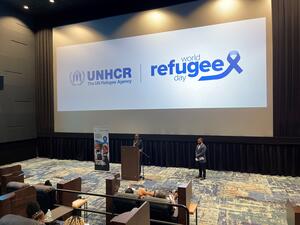World Refugee Day: Forced displacement set to rise in future
World Refugee Day: Forced displacement set to rise in future
Geneva, Tuesday 19 June 2007
GENEVA - As refugees, UNHCR staff and partner organizations around the globe mark World Refugee Day on Wednesday, High Commissioner António Guterres said the numbers of people forcibly displaced through violence and persecution, as well as for other reasons, is set to rise in the future.
"We are very concerned that many conflicts today are not being solved and are becoming worse and worse, resulting in many displacement situations," said Guterres from Southern Sudan where he was seeing first hand the tough conditions and challenges refugees faced when returning to rebuild their lives after decades of conflict.
"For years we've seen a reduction in the numbers of refugees with some massive repatriation operations that have been very positive. South Sudan is an example of these positive solutions. But even with this repatriation record, in the last 12 months the numbers of refugees have been increasing."
UNHCR's 2006 Global Trends report released Tuesday showed the number of refugees in the world had risen for the first time in five years to nearly 10 million, mainly due to the crisis in Iraq which by the end of the year had forced up to 1.5 million Iraqis to seek refuge in other countries. UNHCR also protects and assists, as part of the UN collaborative effort, some 13 million internally displaced people (IDPs) - more than half the world's estimated 24.5 million internally displaced people.
On Monday, in northern Uganda, Guterres joined a convoy of returning refugees and crossed back over the border with them to Southern Sudan as they ended their years of exile and made their way back to their homes. The devastation in the region caused by two decades of conflict poses considerable difficulties for the returnees.
"These refugees returning to Southern Sudan really need international support on a very sustained basis, otherwise there is a risk they could be uprooted again," said Guterres.
Since UNHCR launched its repatriation programme in December 2005, some 155,000 refugees have returned to Southern Sudan from surrounding countries.
But refugees and people displaced inside their own countries because of violence or persecution are only a fraction of people on the move in today's world, said Guterres.
"Increasingly in the future, many people will be searching for economic opportunities or better lives, escaping environmental degradation, natural disasters or a combination of these factors," he said. "What is worrying is that this is happening in the absence of international capacity and determination to respond."
Around the world on Wednesday 20 June, refugees and those who work on their behalf, are marking World Refugee Day with a wide range of events including concerts, art shows, auctions, marches, special lighting of bridges and sports events.
"World Refugee Day is the occasion to remember those tens of millions of refugees and others who have been forcibly displaced, and to recall what makes them different. In an age of increasing globalization, when more and more people are on the move, refugees are not unique because they are away from home. What sets them apart is that they cannot return there," said Guterres.






